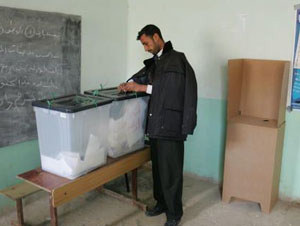Iraq's voting system for provincial council elections
 Baghdad - Election systems very often confirm the proverb that God - or the Devil - is in the details. For the elections to 14 of Iraq's 18 Provincial Councils due to take place on January 31, a so-called "open-list proportional representation" system has been chosen.
Baghdad - Election systems very often confirm the proverb that God - or the Devil - is in the details. For the elections to 14 of Iraq's 18 Provincial Councils due to take place on January 31, a so-called "open-list proportional representation" system has been chosen.
Proportional representation (PR) attempts to allocate seats in a legislature with as much correlation as possible to the votes that the political parties or candidates actually receive, thereby - theoretically - ensuring true democratic representation.
The particular open-list system to be used now for the first time in Iraq will mean that when a voter goes to the polling booth to cast his or her vote for the provincial council, the voter can choose to cast his or her one vote for either a political party (or coalition), or an individual candidate.
The seats in the provincial council will then be allocated firstly to the parties or coalitions based on how many votes they or their affiliated candidates received.
The order in which these quotas are filled by individuals will then be decided on the basis of how many votes a party's individual candidates received.
This is in contrast to the closed-list system used in the last provincial election, in January 2005, which meant that the parties themselves chose which of their own candidates would fill their quotas in the provincial assemblies.
A key addition to this system for 2009 comes in the form of a vague but important provision which could increase the representation of women on the provincial councils.
Article 11 of the provincial elections law, after much wrangling, states that there should be "a woman at the end of every three winners," which, depending on whom you ask, means a guaranteed representation of at least one third for female representatives.
The previous closed-list system was criticized as being less representative, as it left the decisions on who actually sat in government up to the parties themselves.
Closed-list PR works against independent candidates and tends to encourage a toe-the-party-line approach.
It does, however, have the effect of mitigating political fragmentation - in Iraq's five-year-old democracy, perhaps no bad move.
As a result, the new open-list system is in fact a hybrid, designed both to create more direct representation but still work against fragmentation of the vote, because it allows voters to vote for a party or an individual - a "pure" open list system would only allow voters to select an individual.
As the individuals to be elected are only decided after the party quotas have been shared out, the system still works against independent candidates.
This means that in the event, the large parties currently sharing government - the Supreme Islamic Iraqi Council of Abdul Aziz al-Hakim, or the Daawa Party of Prime Minister Nuri al-Maliki - are still likely to push out smaller parties or locally-popular independents.
This is not to suggest that Iraq's political scene is becoming the domain of a few big players - far from it.
The Iraqi Independent High Electoral Commission (IHEC) has said that over 14,000 candidates from over 400 political entities have registered to date.
But if Iraqis go to the polls on January 31 expecting a widespread triumph of the local man over the Baghdad-backed party candidate, there could be disappointment. (dpa)